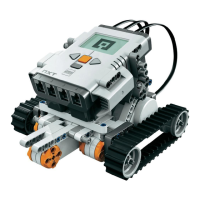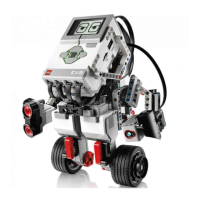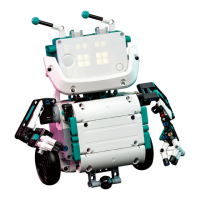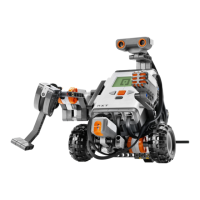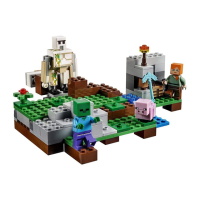Page 184
int motorCommand;
task arbitrate() {
while(true) {
if (cruiseCommand != COMMAND_NONE) motorCommand = cruiseCommand;
if (tagCommand != COMMAND_NONE) motorCommand = tagCommand;
if (avoidCommand != COMMAND_NONE) motorCommand = avoidCommand;
if (taggedCommand != COMMAND_NONE) motorCommand = taggedCommand;
motorControl();
}
}
Note that the order is important. The commands in the end of the list will overwrite the value of motorCommand and are thus higher-level behaviors. For example, if both the cruise and
tagged behaviors are attempting to control the robot, the tagged behavior takes precedence by subsuming the lower-level behavior, cruise.
In this implementation, if no behavior asserts control, then motorCommand will be unchanged, and the robot will just continue doing whatever it did before. This isn't an issue, since
cruiseCommand is always COMMAND_FORWARD. However, in a different program, you might want to set motorCommand to a default action at the beginning of the while loop in
arbitrate().
Where the rubber meets the road
The arbitrate task hands off the actual dirty work of controlling the motors to a subroutine called motorControl(). All motorControl() has to do is examine the value of
motorCommand and set the motors accordingly. Here it is:
sub motorControl() {
if (motorCommand == COMMAND_FORWARD)
OnFwd(OUT_A + OUT_C);
else if (motorCommand == COMMAND_REVERSE)
OnRev(OUT_A + OUT_C);
else if (motorCommand == COMMAND_LEFT) {
OnRev(OUT_A);
OnFwd(OUT_C);
}
else if (motorCommand == COMMAND_RIGHT) {
OnFwd(OUT_A);
OnRev(OUT_C);
}
else if (motorCommand == COMMAND_STOP)
Off(OUT_A + OUT_C);
else if (motorCommand == COMMAND_FLOAT)
Float(OUT_A + OUT_C);
}
The relationship between arbitrate and motorControl is important. At first glance, you might think it makes sense to implement motorControl as a separate
